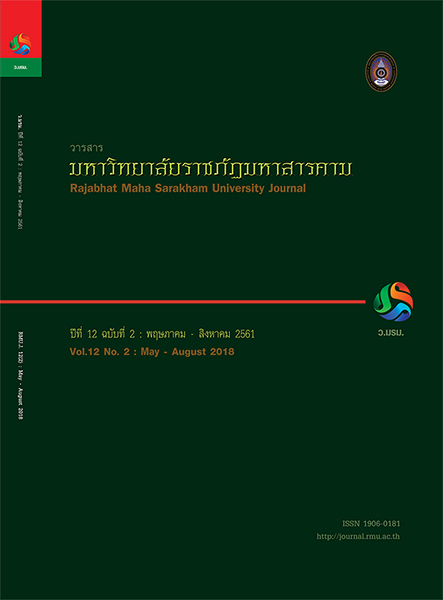โมเดลสมการโครงสร้างแบบผสมปัจจัยที่มีอิทธิพลต่อสมรรถนะการบริหารจัดการชั้นเรียนของครู
Main Article Content
บทคัดย่อ
การวิจัยครั้งนี้ มีวัตถุประสงค์ 1) เพื่อศึกษาสมรรถนะการบริหารจัดการชั้นเรียนของครู ในสถานศึกษาขั้นพื้นฐาน 2) เพื่อจัด
กลุ่มครูตามระดับสมรรถนะการบริหารจัดการชั้นเรียนของครูในสถานศึกษาขั้นพื้นฐาน และ 3) เพื่อตรวจสอบความตรงโมเดลสมการ
โครงสร้างแบบผสมปัจจัยที่มีอิทธิพลต่อสมรรถนะการบริหารจัดการชั้นเรียนของครูในสถานศึกษาขั้นพื้นฐาน กลุ่มตัวอย่าง คือ ครูผู้
สอนในสถานศึกษาขั้นพื้นฐาน สังกัดสำนักงานศึกษาธิการภาค 12 ภาคเรียนที่ 2 ปีการศึกษา 2557 จำนวน 750 คน ได้มาโดยใช้วิธี
การสุ่มแบบหลายขั้นตอน เครื่องมือที่ใช้ในการวิจัยประกอบด้วย 1) แบบประเมินสมรรถนะการจัดการชั้นเรียน 2) แบบวัดจิตวิญญาณ
ความเป็นครู 3) แบบวัดความพึงพอใจในงาน 4) แบบวัดการรับรู้ความสามารถในการสอน 5) แบบสอบถามการรับรู้บรรยากาศองค์กร
และ6) แบบสอบถามการได้รับการถ่ายทอดทางสังคมในองค์การ เครื่องมือทั้งหมดมีลักษณะเป็นแบบมาตรประมาณค่า 5 ระดับ
หาคุณภาพโดยการตรวจสอบความเที่ยงตรงเชิงเนื้อหา (IOC) หาอำนาจจำแนกรายข้อ (Item Total Correlation) และความเชื่อมั่น ทั้ง
ฉบับ (Cronbarch’s Alpha Coefficient) สถิติในการวิเคราะห์ข้อมูล ได้แก่ สหสัมพันธ์แบบเพียร์สัน การวิเคราะห์โปรไฟล์แฝง และ
การวิเคราะห์โมเดลสมการโครงสร้างแบบผสม ผลการวิจัยสรุปได้ ดังนี้ 1) สมรรถนะการบริหารจัดการชั้นเรียนของครู สังกัดสำนักงาน
ศึกษาธิการภาค 12 โดยรวมอยู่ในระดับปานกลาง 2) สมรรถนะการบริหารจัดการชั้นเรียนของครู สามารถจำแนกได้ 4 กลุ่ม ดังนี้
“ครูสมรรถนะบริหารจัดการชั้นเรียนปานกลางแต่นำนวัตกรรมาใช้ตํ่ามาก” “ครูสมรรถนะบริหารจัดการชั้นเรียนสูงมากและนำนวัตกรรมมา
ใช้สูง”“ครูสมรรถนะบริหารจัดการชั้นเรียนสูงแต่นำนวัตกรรมมาใช้ตํ่า” และ“ครูสมรรถนะบริหารจัดการชั้นเรียนตํ่าแต่นำนวัตกรรม มาใช้
ปานกลาง” 3) ครูในสถานศึกษาขั้นพื้นฐาน สังกัดสำนักงานศึกษาธิการภาค 12 แต่ละกลุ่มมีการรับรู้บรรยากาศองค์กร ความพึงพอใจใน
งาน การรับรู้ความสามารถในการสอน และการได้รับการถ่ายทอดทางสังคมในองค์การ ส่งผลต่อสมรรถนะการบริหารจัดการชั้นเรียนแตก
ต่างกัน แต่จิตวิญญาณความเป็นครูมีอิทธิพลต่อสมรรถนะการบริหารจัดการชั้นเรียนของครูทุกกลุ่มเหมือนกัน โดยมีความสอดคล้อง
กลมกลืนกับข้อมูลเชิงประจักษ์ (likelihood = -3766.052, AIC = 7926.104, BIC = 8836.259, ABIC = 8210.707, Ek = 0.970)
Article Details
1. บทความที่ลงตีพิมพ์ทุกเรื่องได้รับการตรวจทางวิชาการโดยผู้ประเมินอิสระ ผู้ทรงคุณวุฒิ (Peer Review) สาขาที่เกี่ยวข้อง อย่างน้อย 3 ท่าน ในรูปแบบ Double blind review
2. ข้อคิดเห็นใด ๆ ของบทความที่ลงตีพิมพ์ในวารสารมหาวิทยาลัยราชภัฏมหาสารคาม นี้เป็นของผู้เขียน คณะผู้จัดทำวารสารไม่จำเป็นต้องเห็นด้วย
3. กองบรรณาธิการวารสารมหาวิทยาลัยราชภัฏมหาสารคาม ไม่สงวนสิทธิ์การคัดลอกแต่ให้อ้างอิงแสดงที่มา
เอกสารอ้างอิง
Learning. Bangkok : S. Chareon Printing.
[2] Patchara witJansirisi. (2011). Development of
Ma agement Competencies. Mahasarakrm :
Mahasarakrm university.
[3] Bandura, A. (1997). Self-efficacy : The exercise of
control. Stanford : W.H. Freeman.
[4] Yon Chumjit. (2007). The Teacher Being. Bangkok
: Odeon Store.
[5] Sumtonrapot Damrongpanit. (2012). Latent
Class Analysis : LCA). Journal of Education
Rajabhat MahaSarakham University, 9 (2), July -
December, 11-23.
[6] Bandura, Albert. (1977). Self-Efficacy : Toward a
Unifying Theory of Behavioral Change.
Psychological Review, 84(2), 191-215.
[7] Choochai Samiththikrai. (2007). Recruitment,
Selection and Performance Appraisal of
personnel. 2 nd Ed. Bangkok : Publisher of
Chulalongkorn University.
[8] Prajuk Sap-Udom. (2007). Human Resource
Development Approach by Competency. Bangkok
: Siri WattanaInterprint.
[9] McClelland, D.C. (1973). Testingfor Competencer
atherthanforIntelligence. American Psychologist.
28, 1 - 14.
[10] Achara Lortrakul. (2014). Competency Development
Of State University Staff. Dissertation Submitted
in Partial Fulfillment of The Requirement for Degree
of Doctor of Philosophy (Public Administration)
Graduate School Mahachulalongkornrajavidyalaya
University Bangkok, Thailand
[11] Nitipon Phootachot. (2013). Organization Behavior.
Bangkok : Publisher of Chulalongkorn University.
[12] Natthapan Khechornnant. (2008). Organization
Behavior. Bangkok : SE-ED
[13] Trinder, J.C. (2016). Competency Standards-A
Measure of the Quality of a Workforce.The
International Archives of the Photogrammetry,
Remote Sensing and Spatial Information Sciences.
37(B6a).Retrieved from http://isprsserv.ifp.
uni-stuttgart.de/ proceedings/
[14] Secretariat Office of the Teachers Council of
Thailand. (2007). Standard and Code of Ethics
of Teaching Profession. 4th ed. Bangkok : Kurusapa
LadphraoPrinting.
[15] Chompunut Romchat. (2005). The Scenario of
Teacher Professional Curriculum in the Next
Decade (2007-2016). Dissertation , Ed.D.
(Curriculum Research and Development).
Bangkok : Graduate School ,Srinakharinwirot
University.
[16] Bandura, Albert. (1977). Self-Efficacy : In
Encyclopedia of Psychology. Kazdin, AlanE. (Ed),
V.7, 212-213.
[17] Bandura, A. (1997). Self-efficacy : The exercise of
control. Stanford : W.H. Freeman.
[18] Tschannen-Moran, Megan . ; Woolfolk Hoy, Anita. ;
& Hoy, Wayne K..(1998). Teacher Efficacy :It’s
Meaningand Measure. Review of Educational
Research, 68(2),202-248.
[19] Veerawan Sukin. (2008). “The Effects of Psychological
Characteristics and Working Situations on
Effective Teaching Behavior of Engineering
Lecturers”. Journal of Behavioral Science, 14 (1)
September 2008, p.1-18.
[20] Hackman, J. Richard. ; & Oldham, Greg R. (1980).
Work Redesign. Reading,MassachusettsAddison-
Wesley.
[21] PunyadaPraditbathuka, UngsinunIntarakamhang
and NumchaiSupparerkchaisaku. (2013). The
Psycho-Social Causal Factors Affecting the
Competency and Research-Based Instruction
Behaviors of Faculty Members of Rajabhat
Universities in Bangkok Metropolitan and Vicinity
Area. Journal of Behavioral Science, 19 (2), July.
[22] Ladda Patcharavipas. (2007). The Impact of
Organization Climate on Work Motivation and
Work Efficiency A Study Case of Temporary Staff
- True Corporation Public Company Limited.
Master of Science (Human Resources and
Organization Development) : National Institute of
Development Administration.
[23] Prathuan Moonlar. (2009). Factors Related to
Competencies on Classroom Management of
Secondary School Teacher in Grade Level 3 in
the Schools under Bangkok Educational Service
Area Office 1. SWU Educational Administration
Journal, 6(11), July-December, p.15-36.
[24] Surasak Anantasawad. (2011). “A Cause and Effect
Model of the Competency Teachers under the
office of Basic Education Commission”. Journal
of Social Science Research, 7(1), 1506-1523.
[25] Jarunee Keawthong. (2008). Research competency
of researchers in Chiang Mai University. Master
of Political Science Thesis : Chiang Mai University.
[26] Wei Liu. (2004). Perceived Organization Support :
Linking Human Resource Management
Practices With Important Work Outcomes.
Dissertation. Ph.D.USA : University of Maryland.


